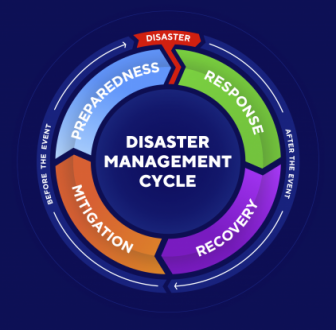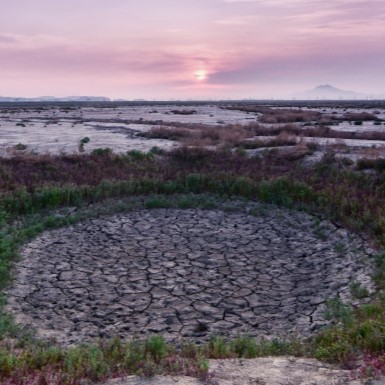The Challenge
According to the World Meteorological Organisation, the number of climate-related disasters, such as flooding, drought and hurricanes, has increased fivefold over the last 50 years. Economic losses from a growing number of extreme climate-related events are rising. In the EU, these losses already average more than EUR 12 billion per year. As this trend is unfortunately expected to continue, there is an urgent need to prepare adaptation measures to counteract these events. Climate adaptation requires both individuals and economies to adjust to events brought on by environmental change and to prepare for future developments. Climate adaptation requires collaboration and mutual exchange between private and public stakeholders, ideally across different countries, as actions are more effective if they are systematic and across all sectors of the economy. In this context, space assets have a key role to play in improving the resilience of society and economies in the face of climate-related natural disasters. Satellite communication technologies are crucial for supporting communication and data transfer at anytime and anywhere. Earth Observation data is necessary to monitor the environment and the weather, and how these evolve and influence each other. Satellite positioning data is crucial to providing accurate information about placement and timing.
The Opportunity
This intended Invitation to Tender (ITT) for Feasibility Studies aims to promote the operational and commercial roll-out of services to improve the resilience of society and economies against climate-related natural disasters. The services will target the mitigation, preparedness and response phases of the disaster risk management cycle, reducing vulnerability to the impact of disasters and tackling either the readiness for or the immediate action after a disaster.
Feasibility Studies should start in 2024 and run for 9 months.
Topics Of Relevance
The following relevant topics were identified for this Invitation to Tender, along with examples of potential applications that could be proposed.
- Early Warning Services: These are considered the top priority for climate change adaptation, as an inexpensive and effective means of protecting people and assets from hazards in terms of investment/return. The crucial element in early warning is to observe and monitor the environment and the weather. To build a dependable model, data must be collected frequently and with an adequate geographical coverage from a network of geographically dispersed sensors, including local weather stations and other in-situ sensors.
- Anticipatory Action. Anticipatory actions aim to reduce the impacts of a forecast hazard before it occurs or before its most acute impacts are felt. They represent a paradigm shift in handling climate disasters as the focus is not in reacting to a natural disaster but in acting ahead of it, and it is an urgent need in order to set up the right action strategies when disasters occur.
- Financial Climate Risks. Natural disasters massively impact all communities, posing a risk to the life of the people and destroying their houses, as well as causing all kind of economic losses. For this reason, institutions and companies need to understand risks coming from climate sources that affect their clients and their portfolios, quantifying their exposure to such risks in a consistent manner based on a reliable method. Setting the right financial triggers based on reliable indexes is a very high priority, where each type of natural disaster should be assessed individually.
- Urban Resilience: Even if the importance of adaptation is increasingly recognised across the globe, multiple reports still highlight the lack of preparedness of cities. Assessing exposure risk and vulnerabilities, improving data collection and promoting nature-based solutions are instrumental for improving resilience, prevention and preparedness in urban areas. Cities and urban conglomerations need to protect their inhabitants and their assets in the aftermath of a natural disaster, as well as on effectively deploying a plan to limit damages.
Value Of Space
Services that support society’s adaptation to climate change will benefit greatly from the combined use of satellite communication and positioning, as well as Earth observation imagery.

Global Navigation Satellite Systems (GNSS) are essential to coordinating and managing resources following a disaster and to track the position of vehicles, vessels or any moving element of the response solution. GNSS is also necessary to locate the position of sensors that measure physical parameters for early warning or to monitor the evolution of the disaster. The geolocation of the natural disaster event also plays a key role in coordinating early warning actions.
Satellite Telecommunications (SatCom) is required to send early warning messages when a natural disaster occurs, whether to individuals or to in-field action institutions to coordinate assistance and support. It plays a fundamental role in providing connectivity in the aftermath of an event when terrestrial communications are not available or overloaded. It can be used to provide connectivity for in-situ data collection in remote areas, providing an additional layer of information, which can be combined with SatEO data to generate actionable outputs.
Satellite Earth Observation (SatEO) data sets can be used for both monitoring and change detection, as well as for historical analysis and providing inputs to nowcasting and forecasting models, e.g. for landslides, weather predictions and floods. SatEO data is an important tool for measuring natural disaster occurrences and for monitoring this data over time to ensure an improved understanding of these events, so that they can be predicted in the future. This data, combined with SatCom systems, is highly effective in reducing disaster risk impacts.
What We Offer
We offer funding and support to companies, both for business case assessment and for the development of new, space-based services. Our offer includes:
- Zero-equity funding
- Technical and commercial guidance
- Access to our network and partners
- ESA brand credibility
ESA will co-fund 80% of the acceptable cost, up to €200K, per awarded study.
What We Look For
We look for promising business ideas addressing topics of relevance or related areas that propose:
- Attractive market opportunities, identified customer needs and customer engagement
- Commercially viable service concepts
- Technically feasible solutions
- Added value of space data or technology
- Motivated teams with business, technical, and financial expertise
Who Can Apply
This opportunity is open to companies that intend to develop space-enabled services and products related, but not restricted, to the topics of relevance outlined above. To be eligible for funding, your team must be based in one of the following countries: Austria, Belgium, Czech Republic, Denmark, Estonia, Finland, France, Germany, Hungary, Ireland, Italy, Lithuania, Luxembourg, Norway, Poland, Portugal, Romania, Slovenia, Sweden, Switzerland and United Kingdom. Teams can involve non-European entities, but their contribution to the activity cannot be funded by ESA. Authorisation of Funding letters from the corresponding National Delegations are required as part of the application.
How To Apply
- Register your team on esa-star Registration today. If your team is made up of more than one organisation, each entity will need to register.
- Download the official tender documents from esa-star when the opportunity opens. This includes a letter of invitation, proposal template, draft contract, and additional information about this opportunity.
- Prepare your proposal using the official tender documents and reach out to your National Delegation to obtain a Letter of Authorisation.
- Submit your proposal via esa-star Tendering by the deadline.
Webinar
A webinar is planned on 04th October 2023, 11:00 – 12:00 CEST. Register by using the button at the top of page.
Speakers:
- Iñigo Alonso Etxebarria, Business Applications Engineer, European Space Agency (ESA).
- Markus Enenkel, Disaster Risk Finance Specialist, World Bank.
- Antoine Bavandi, Global Head of Public Sector, Parametric & Climate Resilience Solutions, GallagherRe.



